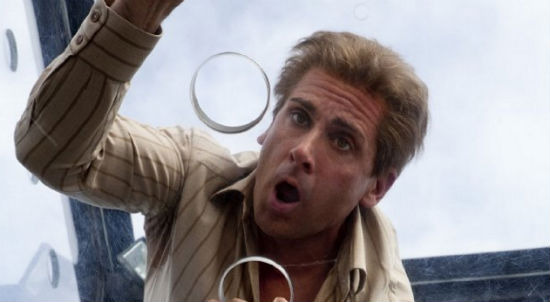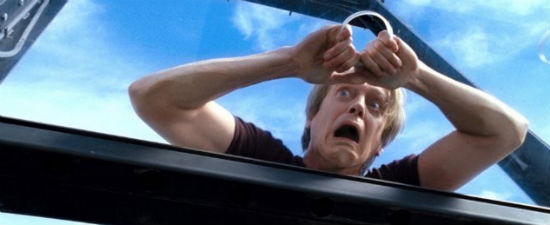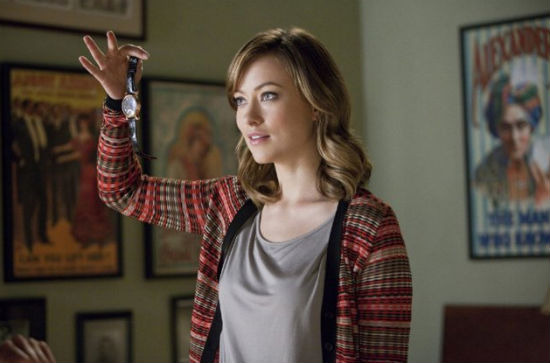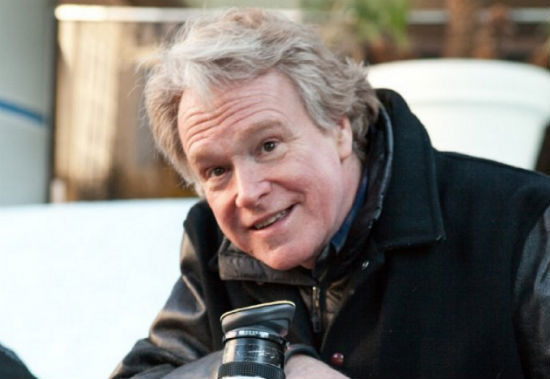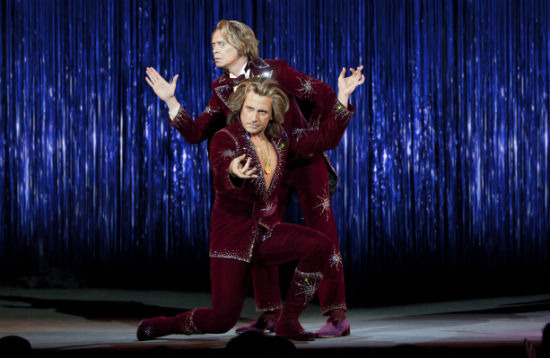Steve Carell, Steve Buscemi And Olivia Wilde Talk On Set Of 'The Incredible Burt Wonderstone'
One of the biggest selling points for The Incredible Burt Wonderstone is its equally incredible cast. Steve Carell, Jim Carrey, Steve Buscemi, Olivia Wilde, Alan Arkin, and James Gandolfini are some of the most well-respected and popular actors working today. Among them there are two comedy legends, two brutal TV gangsters, and multiple award winners. It's a murderer's row of talent.
While on set of the film, which opens March 15, we were fortunate enough to talk to a few of them. And while some of the best quotes are in the first set visit report, we decided to pull a few extra quotes just to give you addition information about the film. Things such as what it was like working with Jim Carrey, who wasn't on set and why director Don Scardino chose to shoot the comedy on 35mm. Read quotes from Carell, Buscemi, Wilde, Scardino and producer Chris Bender below.
Steve Carell:
Q: How many variations of these costumes do you get to wear?
Boy. There's different stage costumes for our stage work. We also travel back. There are flashbacks to earlier versions of Burt and Anton. Their costumes chance accordingly. Also, what Burt and Anton wear as their street clothes are very specific to them as well. They're clearly in costume even when they're not on stage.
Q: How do you feel in it?
Extremely sexy. My agent came today and she couldn't keep her eyes off me. She's seeing a completely new person. I wear it on weekends. I wear it to my wife's delight.
Q: Talk about working with Jim Carrey.
Oh my gosh. Talk about a fertile mind. That guy could do 50 takes and they could all be completely different. The trick with him is really an abundance of riches. You don't know which one to choose because one is just different and equally funny. Again, he supplies you with so many different variations. It's sort of an editor's dream. Whatever is called for in the movie you will find in his performance. He's completely committed too. He was doing things — physical things — that didn't seem human to me and he was doing them in a practical manner with no special effects. It was all him. It was all just his own commitment to the part.
Q: We were hearing that there's a certain degree of slight-of-hand that you have to learn. How has that been?
Oh, I'm fantastic. Let me show you! Yeah, I've been taking some lessons. It's tricky, though, because what you can acquire in a few months' time is not going to replicate somebody who has studied for 20 years. I've studied magicians in general, too. I went to the Magic Castle and I went to Vegas and saw a lot of shows. I've observed them. Their acts and not just the technique of the trick but the technique of the presentation itself which is, I think, an art form as well. Every magician has a different style and a different way of communicating with the audience. They're fun. Again, it's something where, when you go without any cynicism and just embrace it, it really sort of transports you. It's fun. We went to see David Copperfield and Chris Angel when we were in Vegas and they were fantastic. I'd never seen either of the before. I don't know. I think it's a really fertile area for a movie like this.
Q: You're a producer on the film, what made you think of Steve Buscemi for this part?
The part has a sort of innocence and a naivete. He's very kind and a very generous soul. I think that's a part that — I mean, he's a great actor, apart from anything else. He could play every part in this movie and be fantastic at it. But he just seemed exactly right. And man is he funny. He's just so good. He's real. He makes very specific and clean choices. I'm a huge admirer.
Steve Buscemi:
Q: You've always had a great balance of dramatic work and comedy work. Is it a very different mindset coming onto a set and knowing it's a comedy?
No, I mean, the preparation is the same. But I'd say on this it's just a bit looser, and there's room for improv. Whereas on, say, Boardwalk, we really stick to the script. Not that we're not sticking to the script on this, there's just more room for improvisation.
Q: Do you appreciate that?
Sure, yeah. I think that really helps when you're doing a comedy and working with guys like Steve Carell, who came from Second City. He's really used to it, and Jim Carrey as well.
Q: Were you a big magic fan as a kid?
Yeah, I had a magic kit. I never really followed through on it, but I had my phase of wanting to do it, sure.
Q: Have you been picking it up again recently?
Just a little bit. We've been working with David Copperfield, who's a consultant on this, and he's been great. There's a magician, Jonathan Levit, and he's been teaching me some of the slight-of-hand stuff. Yeah, it's fun.
Q: Producer Chris Bender just described Burt as a little bit of a douchebag. How would you describe your character? Is he shy, is he outgoing?
He's maybe more of a thoughtful guy. I don't know if he's necessarily shy. But I think his feet are on the ground a little bit more. He's in awe of Burt, and I think he really loves being in this partnership, even though at times it's frustrating. I think he really loves having a partner, and he just thinks the world of Burt.
Q: Steve's obviously improv'd a ton. Is it intimidating for you to go with him when he brings that sort of improv out there? Talk about that dynamic.
I never did improv professionally, but that was certainly in my training as an actor. I like it. Actually, when I did theater, I used to have a partner, and that was the way we used to write a lot of our sketches, through improvisation. So it's something I feel comfortable with, and when you have somebody like Steve, he really listens. He really plays off of the person he's improving with. It's a nice give and take.
Do you ever have a goal when you're improving with Steve to try and get him to break? Is that part of game?
Um... no. [Laughs] I'm usually just trying to keep a straight face myself, because he's very funny.
Olivia Wilde:
Q: What is it like improving with Steve Carell?
I think the reason it's really fun to improv with Steve is that he's not playing a game of solitaire. He's very giving, he's very generous. He's kind of lobbing you the ball. I think he's a comedic genius who is really creating a fair playing field so that you have the chance to hit the ball back and have fun with it. It's not like he's trying to challenge you or dodge you, he's actually trying to rally. I'm using all these tennis metaphors! I don't play tennis! [ laughs] I don't know why it's in my head. I should be using football after last night. [NOTE: Set visit was the day after the Super Bowl]. I just think that he makes it fun and all you have to do is listen and react and never deny and say, "Yes, and..." You just go back to your basic training in improv. With someone that good they just make it interesting for you, and fun. I felt that with all these actors. We just have a lot of fun together. Everyone is just so game and they're all so smart and sharp. They have set you up for something really fun and great for every scene. I hope I'm not being too vague, but I think it's been really interesting for me to learn from all the different types of comedians in this movie. Steve Carell is so different than someone like Jim Carrey. To get the experience of improving with both of them has been really tremendous for me. I'm just floored every day. I just can't believe I'm here.
Q: What's it like working with Jim Carrey? What's your personal connection to him been like?
He's wonderful! It's sort of surreal to be eating lunch next to Jim Carrey at [craft services] and then go shoot a scene with him. He's a comedy god – all of these guys are. But really, Jim Carrey I woke up watching closely. Ace Ventura blew my mind. Fire Marshall Bill was a huge part of my childhood! To be with him and witness the process is such an extraordinary thing. I mean, he is a perfectionist. He is so incredibly physical, and in control of his physical comedy. It's like watching a dancer. It's amazing. He's always at 100%. He has incredibly high standards for himself and it's wonderful to watch him reach them. He's a real interesting person too. We both share a passion for Haiti. He's done a lot of great, interesting work down there. It's amazing. I remember I sat down at the table read, and I suddenly realized that to my left was Jim Carrey and to my right was Steve Carell. Then there's Steve Buscemi, Alan Arkin, James Gandolfini... I was thinking, "They must mean a different Olivia Wilde" [laughs]. I couldn't believe it was happening and I took a picture secretly of our names on our little cards. I just couldn't believe that I got to hang out with them. I've really learned something every day and taken advantage of that opportunity. Specifically with Jim, it does blow my mind of think of all the movies that are important to me. I think I've seen Dumb and Dumber 47 times at least. Now to be able to watch what it takes to reach those heights with all these people... Comedy is fun to make, but it's taken as seriously as drama. Of course, you know all this, talking to people much more experienced than I am. I'm learning that in a really wonderful way and I'm hoping that this isn't the last time that I get to do that.
Don Scardino:
Q: We heard a bit about the great scenes you already shot with Jim Carrey. Is he hard to direct because he's just all over the place?
No, no, he's easy to direct because he kind of self-directs. As long as — and we have from day one — agreed about the character and where you're going. It's very interesting, his process. He likes to watch playback. He's a painter you know, and he sort of interprets his own performance graphically, like, "I need to do something better with my eyes. My hands should be here," and he thinks of it like a graphic image, in a way. Some actors work from the inside out, he works from the outside in, I think. It's a fascinating process. He's a perfectionist. He likes to do a lot of takes, but he really likes to get it right. He's done enough movies to understand that they don't go away. You really want to make sure you've done everything that you can — you're sometimes at the mercy of the studio or the cutter or the director because they're going to do their own version of your performance. But at least he can be satisfied and say, "I got exactly what I wanted." It's fascinating to work with him, actually.
Q: You're shooting this film, a comedy, on film. Can you talk about the decision? Was there a lot of pressure to go digital?
Yeah, some. Studios are so used to digital now and there is a mythology that it's cheaper. But it's really not cheaper. For instance, digital is great for night exteriors, everybody knows it's a video tap, so it's very responsive to light. So you can go out at night, shoot with digital and it's gorgeous, beautiful to look at . Conversely, you go out and shoot day exterior, and it slams you, just like you know from your own video recording. Bright, hot, white light is killer to video. Everything gets washed out. So you spend a lot of time trying to light a scene and digitally you spend a lot of time trying to knock light down. And frequently, you're putting up negative fill, as opposed to putting up fill lights you're putting up blacks to absorb light. So all that takes about the same amount of time. They did a budget and they discovered that it would be no cheaper to shoot digitally. I felt this was a movie that ... the colors in the magicians' palette are a lot of black, a lot of red, which are the two colors that digital doesn't handle well. Red blooms terribly and you have to be very careful of how you use red. Blacks do not come out with a richness that happens on film. And there's also something about the emotional nature of the story, there's a big flashback sequence at the beginning to their childhood, I just felt that it needed the warmer texture of film. Of course the d.p. on down, everybody loves to shoot film, everybody laments the death of film, so it was great that they said yes. Film and 2:35.
Q: After working on 30 Rock, what's been the biggest surprise for you stepping onto a film set?
The biggest surprise is that it's exactly the same. The work is the work. I've been shooting comedy for five years with wacky actor personalities, and it's the same zoo. It's nuts, it's fun. It's fun to come to work and laugh every day. I used to do all these "Law & Orders" and dramas and stuff and I got tired of "How much blood do you want?" and "Are there three exit wounds?" and "Did he get shot in the eye or over the eye?" Gee, I don't know. I think I want to laugh.
Chris Bender:
Q: You mentioned that this script had been in development for so long. Could you talk about what the difficulty was and what finally cemented it that we're shooting now?
I think it was two things: it was tone, finding the right tone, because it was originally written more broadly where certain magic things were happening that wouldn't actually be real magic and also, over time, the references that we were making in terms of the new school of magic and the old school of magic were becoming dated. Also, finding what the reality of the story was, of the characters. A lot of it was just finding the right tone and making it feel like a real story. Once Steve Carell came on board, that's when things really took off. He saw it for what it was: a big commercial comedy. But at the same time, as an actor he just grounds things and he brings an emotionality to it that we needed to service in the writing so that took a little time. And then finding the right director, too. These kind of comedies scare directors a lot because you're taking a chance and you're going for something bold comedy-wise that either could be a big hit or it could really miss.
Q: Is Jim Carrey's character like a David Blaine?
He's kind of a mix of a David Blaine, Criss Angel, street magic, it's all rolled up into one. Then, Jim Carrey, of course, kind of makes everything his own. He took it to another level, adding this kind of spiritual element to this character. He's got this unbelievable passive-aggressive, "I'm better than everyone, I'm on another level." So his arc is this journey of being exposed for who he really is: a douchebag. [laughs] So Jim...and it took a while to find that; we didn't want to make it just a straight up parody of those guys, one, because seven years ago they were a lot more popular than they are now. Criss Angel's doing his show in Las Vegas, David Blaine does smaller things, but he doesn't have a big TV special or anything on. We got away from it being old school vs new school even though that's still a big part of the concept. It's more about the Burt character and his fall from grace and Steve Gray, Jim Carrey's character being introduced as this new version of magic that's infringing upon what he does. It helps him rediscover what he loved about magic in the first place; a lot of that was his partnership with Anton. But, trying to define what those tricks were was fun. Just coming up with crazy things: pulling cards from his face, being a human piñata, ultimately drilling a hole in his head as a trick. They're all little bits and they're nice and contained, so you just want to shoot more and more and more of them, because you never know where you're going to use them in the movie. They're constantly being referenced like, "What is this? It's ridiculous! It's not even magic!"
Q: It sounds like reminiscent of characters Carrey's played in the past, a little more outrageous.
And that's exciting. It's exciting because I feel like, as a Jim Carrey fan myself, wanting to see him do something that brought back the bigger comedies that he used to do. We pretty much finished up shooting with him. At one point he called up the director and said it was the most fun he's had and he felt like he was as funny as he's ever been. He hasn't really had the opportunity to do something where he could combine the physical comedy with an absurd character. It freed him in a way. He's off the cuff, he's unbelievable. He came up with things that weren't on the page, he just took things to another level. He's great.
The Incredible Burt Wonderstone opens March 15.

